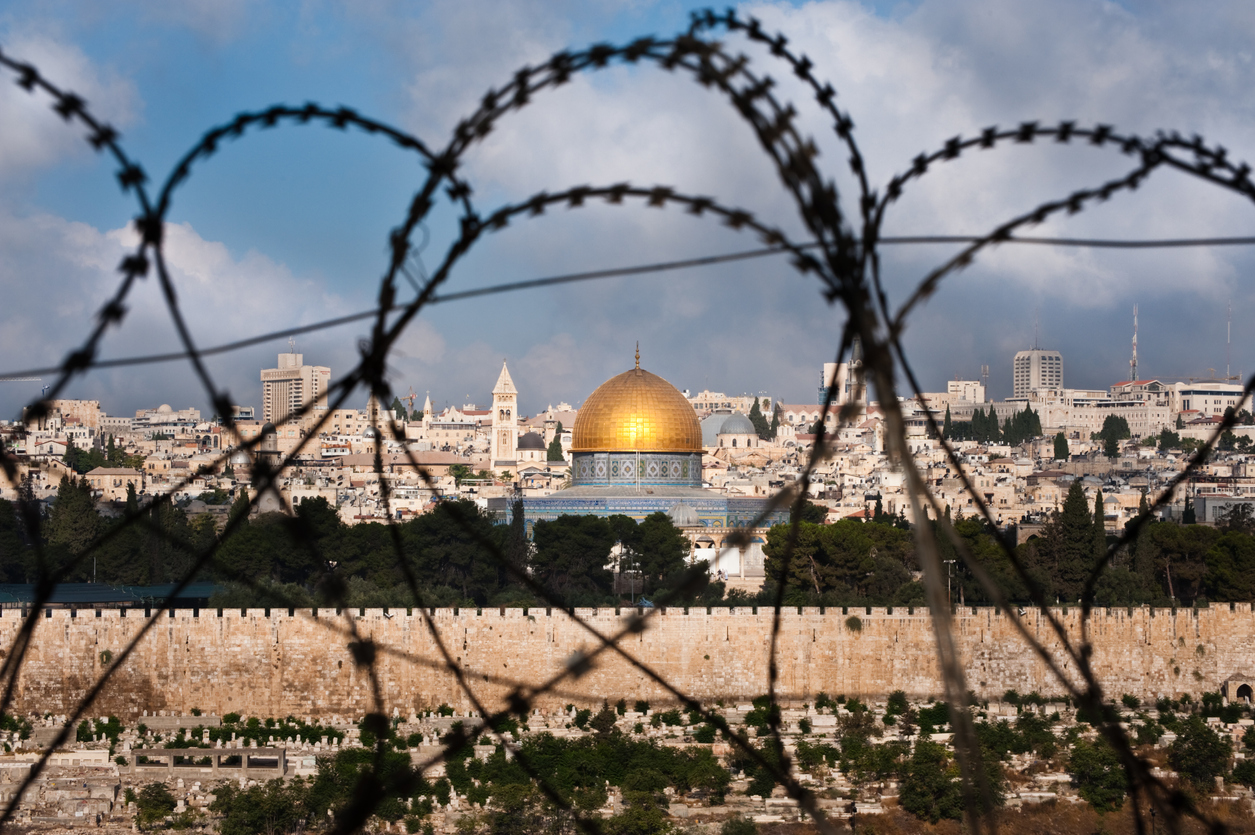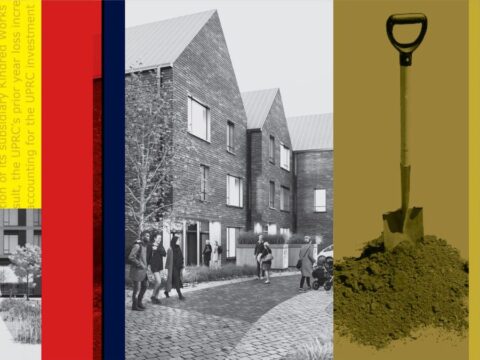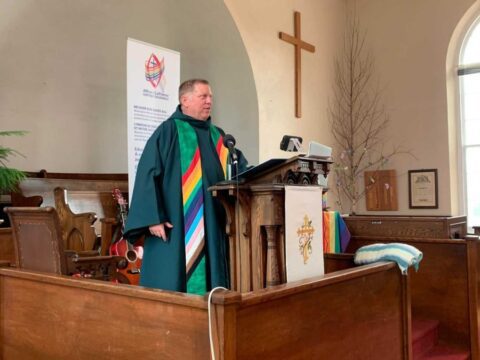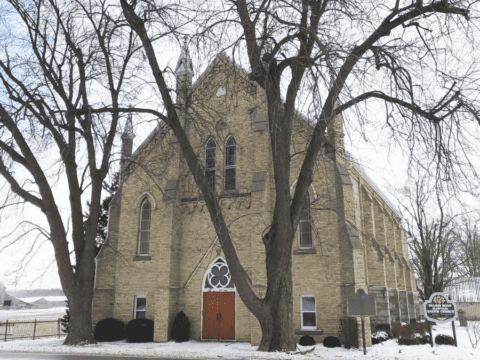Calling Palestine and Israel a hot-button topic in The United Church of Canada is an understatement. Rev. Martha ter Kuile, who chairs the Just Peace Task Group, knows that.
Appointed in 2018, the five-person group is the latest to look into the issue: whether the church should recognize Israel as a Jewish state, deem its treatment of Palestinians as apartheid under international law, and use economic and non-violent methods to resist Israel’s continuing occupation of Palestinian territory.
You may unsubscribe from any of our newsletters at any time.
A proposal routed through the Executive of General Council last November does not directly recommend policies on those questions, but asks the church’s 44th General Council to look at the matter in light of a set of 14 principles. The first calls for “zero tolerance for all forms of racism, including anti-Semitism” while the last expresses “a deep desire to stay in dialogue with partners…even when we are in disagreement.” If adopted, those principles would guide General Council’s Executive or its staff in making ongoing decisions on statements or policies as situations evolve in the Middle East, helping to keep church policies and statements current.
Council — which began meeting online last February and wraps up in August — will also deal with proposals coming from Regional Councils, asking the church to take various more specific and immediate actions to support Palestinians’ human rights, including backing the Boycott, Divestment and Sanctions movement and naming Israel as an apartheid state.
Introducing the Just Peace report at a recent General Council learning session, ter Kuile says the church “has struggled very strongly to have a civil conversation with ourselves,” and calls the Palestine and Israel issue “divisive” and “toxic.”
Her analysis proved true later in the session, when interfaith guest Richard Marceau of the Centre for Israel and Jewish Affairs (CIJA) was interrupted by an anonymous obscene comment.
The outburst, questioning Marceau’s right to address the online gathering, wrote yet another chapter in the long story of the church’s well-intended support of Middle Eastern church partners and harsh reaction from Canadian-based lobbyists supporting Israel.
Rabbi Allan Finkel, of Winnipeg’s Temple Shalom, who joined Marceau as an interfaith guest at the GC 44 session, calls the interruption “pretty nasty work” in an interview. Marceau, for his part, says he was less concerned about use of the F-word than “somebody . . . challenging the very idea of a Jew speaking to a Jewish concern.”
But one commissioner says the commenter may have been irritated about a lack of balance in the meeting— that the church invited CIJA, a pro-Israel lobby group, but not representatives from any other Jewish groups.
Complicated history
The United Church’s struggle to support Palestinian partners plays out against a background of centuries of Christian anti-Semitism and a report the church adopted in 2003 warning against “any attempt to demonize Israel as intrinsically evil and thus a nation unlike other nations….”
Often cited by opponents of church actions or statements that question Israeli government actions or policies — including Marceau and Finkel — the report affirms “that the State of Israel has the right to exist in peace and security” and encourages the church to learn about Judaism and resist anti-Semitism.
But the report also says: “Legitimate criticism . . . concerns itself with specific policies and actions on the part of Israeli leaders and governments, as well as the enduring problems and tensions of Israeli society.”
The church’s current policy on Palestine and Israel, adopted in 2012, led to the Unsettling Goods economic action campaign encouraging a boycott of goods manufactured in West Bank settlements in occupied Palestinian territory. In response, the CIJA declared a moratorium on partnerships and dialogue between Jewish communities and all levels of the United Church.
More on Broadview:
- 3 faith leaders on why the Palestine-Israel conflict is not a religious one
- Expletive-laden remark shocks attendees at General Council meeting
- The Uyghurs are being ethnically cleansed in northern China. Why aren’t we doing more?
This year, six Canadian rabbinical groups came out against some of the Palestine and Israel proposals to GC44 and CIJA was invited to attend General Council as an interfaith guest.
“We believe in interfaith relations,” says Marceau, CIJA’s vice-president and general counsel. “So let’s call it a last-ditch effort to make this right.”
The 2012 report behind the church’s current policy rejected a description of Israel as apartheid, but the Just Peace report, which the General Council Executive has already adopted, opens that up for discussion. It says the church “could affirm the accuracy and usefulness of the term apartheid to describe laws and legal procedures of the State of Israel that enshrine one people in a privileged legal position at the expense of another.”
Today, naming Israel or its government’s actions as apartheid would simply put the United Church in line with Human Rights Watch, Amnesty International and Israeli human rights group B’Tselem, plus a couple of United Nations reports.
Former Observer editor critiqued Israel
Church concerns about Palestine and Israel go back at least a half-century to 1971, when Rev. A.C. (Al) Forrest, former editor of the United Church Observer, wrote and published The Unholy Land. The bestselling book outlined the plight of Palestinian refugees in the wake of the 1967 Six-Day War between Israel and an Arab coalition.
Forrest — who visited Israel and Palestine frequently and lived in the Middle East for almost a year — wrote: “Contrary to the highest ethical concepts of Judaism, Israeli Jews now practise racial discrimination. If they insist on maintaining the kind of Jewish state they have been building, they will have to continue to practise racism and apartheid. Such policies and practices . . . make a just peace impossible.”
Forrest was labelled as anti-Semitic and vilified by North American Jewish organizations and their supporters. Some in the United Church believe stress over the controversy contributed to his premature death in 1978.
Finkel points out that martyrs to the failed cause of peace in the Middle East also include Israeli Prime Minister Yitzhak Rabin, killed by a militant Israeli extremist and Egyptian President Anwar Sadat, killed by a pro-Islamic army officer and his associates. “The preconditions for peace are not based on correcting historical wrongs and blaming, but on finding common ground and trust. And you need good leadership along the way.”
United Church members and ministers who follow in Forrest’s footsteps are pushing for actions they hope will lead to peace. Many are members of the United Network for a Just Peace in Palestine and Israel (UNJPPI).
“If you’ve sat in a courtroom and watched children be put on trial and sat at the bedside of a child who’s been shot unjustly and know that their lives are forever changed… it changes your perspective.”
Some of them have also participated in the Ecumenical Accompaniment Programme in Palestine and Israel (EAPPI), a World Council of Churches program in which participants spend three months experiencing life under Israeli occupation. The United Church says they “provide protective presence to vulnerable communities, monitor and report human rights abuses, and support Palestinians and Israelis working together for peace.”
Past EAPPI participants are among those encouraging the church to join its Palestinian partners in naming Israel’s actions as apartheid and adopting BDS as a way to push for peace and justice. Keith Simmonds, diaconal minister at Duncan (B.C.) United is one of the architects of a proposal from Pacific Mountain Region asking council to affirm that “the actions of the Government of Israel conform to the definition of an apartheid state,” and adopt BDS. He served with EAPPI in late 2019 and early 2020.
Simmonds says when he and other commissioners behind pro-BDS proposals learned that General Council staff chose to invite CIJA representatives as interfaith guests, they e-mailed the moderator and general secretary urging them “not to invite them or at least to [also] invite Independent Jewish Voices (IJV) or some other representative of the Jewish community….” Those e-mails were not answered. Simmonds thinks the obscene open-mic outburst may have come out of frustration over those unanswered requests.
The general secretary’s office confirms that it was asked by commissioners to invite IJV, a Canadian organization that says it advocates for justice and peace in Palestine and Israel.
Rowan Gaudet, IJV Canada’s communication and media lead, says the group wants Canadian and international organizations to call out Israel for practising apartheid against Palestinians. Gaudet also warns that “accusations of anti-Semitism have become commonly and falsely weaponized against those who criticize Israel’s policies and actions, including the United Church.”
None of that is news to Rev. Steve Berubé, minister at St. Paul’s United in Riverview, N.B, who served the EAPPI program in Bethlehem in 2013 and 2016. He is not a commissioner to this summer’s General Council but says “it would be helpful for our Palestinian partners to hear us echo the words of what others have bravely spoken before us . . .
“If you’ve sat in a courtroom and watched children be put on trial and sat at the bedside of a child who’s been shot unjustly and know that their lives are forever changed… it changes your perspective.”
View this post on Instagram
After returning from Palestine and Israel, and sharing his experiences, he says “I lost most of my existing Jewish friends… but it took me a couple of years to realize that I had more Jewish allies and friends across the country than locally.”
As in the past, CIJA and its allies warn that supporting BDS and naming Israel’s actions as apartheid will also mean losing Jewish friends.
“Whatever the United Church says about what happens there, nobody cares in Israel,” says Marceau. “Where it does have an impact is with relations between [the] United Church and Jews here. When you call Israel the nation-state of the Jewish people, this project, inherently racist, that has consequences for Jews here… it foments and allows anti-Semitism to grow.”
As if issues around Palestine and Israel are not complicated enough, even anti-Semitism has differing definitions. The International Holocaust Remembrance Alliance 2016 definition is supported by the Canadian and U.S. governments and favoured by pro-Israel lobbyists such as CIJA. The other definition, outlined in the Jerusalem Declaration of 2021, says that “boycott, divestment and sanctions …in the Israeli case … are not, in and of themselves, anti-Semitic.”
For the United Church, adoption of a principles-based approach to its positions on Palestine and Israel won’t necessarily prevent it from naming Israel as an apartheid state and adopting BDS as a way to push for a solution to the Palestinians’ dilemma. But the approach may take some heat out of the issue and offer a basis for a more civil discussion.
“I hope the General Council adopts our proposal to use a principle-based approach in conversations about Palestine and Israel,” says ter Kuile, “not so much to avoid the deep emotion of these issues as to ensure respect and care for one another as we grapple with them.”
***
Mike Milne is a writer in Owen Sound, Ont.















These views position the United Church as irrelevant to any serious discussion of the issues facing the modern Middle East. No mention of the innovative Abrahamic Accords, for instance, which bring together Arab states wishing peaceful ties with Israel.
If the church reserves the policy to label Israel an apartheid state than the clergy within our church who oppose such a policy maintain the public position that the UCC leadership is anti-semitic. Of course that is an idiotic state to be in but it is one UCC senior leadership has put us in for the past decade and more.